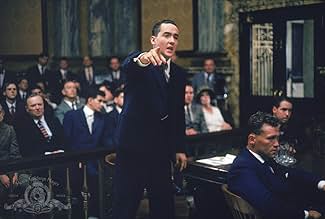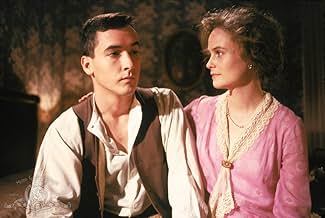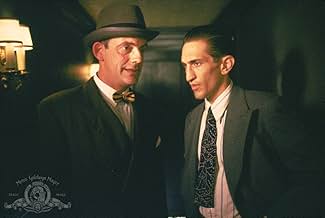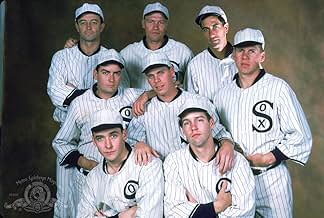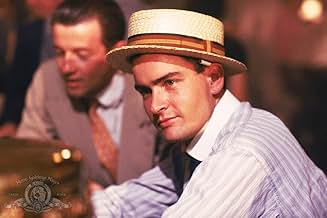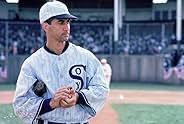A dramatization of the Black Sox scandal when the underpaid Chicago White Sox accepted bribes to deliberately lose the 1919 World Series.A dramatization of the Black Sox scandal when the underpaid Chicago White Sox accepted bribes to deliberately lose the 1919 World Series.A dramatization of the Black Sox scandal when the underpaid Chicago White Sox accepted bribes to deliberately lose the 1919 World Series.
- Awards
- 2 nominations total
James Desmond
- Smitty - The Writers
- (as Jim Desmond)
- Director
- Writers
- All cast & crew
- Production, box office & more at IMDbPro
7.223.6K
1
2
3
4
5
6
7
8
9
10
Featured reviews
Good Movie, GREAT BOOK
This is one of the greatest sports stories ever told, the real story about how and WHY they fixed the World Series. Eliot Asinof's book should be read by anyone interested in history, and Sayles does an admirable job of tying it all together into a script (Sayles even cast Asinof in the movie, and then cast him again in Sunshine State.) It's a story that anyone interested in a history of America, a history of labor and management, a history of the greatest game will definitely enjoy. After reading it, the Shoeless Joe character from "Field of Dreams" suddenly has a resonance which that particular film could never explain (though it is nicely explained in the source for that film "Shoeless Joe") Also worth reading is "The Glory of Their Times" an oral history of early baseball.
When the world was corrupt.
I especially enjoyed Studs Terkel and John Sayles as the two sportswriters, Fullerton and Lardner. They're very droll. They act as a kind of Greek chorus, making cynical wisecracks, keeping the audience clued in on what's supposed to be going on. As the White Sox play out yet another crooked game, Sayles said to Terkel, "Nothing but fast balls." "Nice, sloow ones," adds Terkel. It gets better. Terkel writes a column for the Chicago paper accusing gamblers of corrupting the game of baseball and Sayles is reading it aloud. "Writers are tainting the game," or something, says Sayles. "Keep reading," says Terkel. "The game would be better off without the long-nosed, thick-lipped Eastern element preying on our boys in the field." Terkels smiles around his cigar and says, "Makes you proud to be a sportswriter, doesn't it?"
The rest of the movie is pretty good too, although I sometimes get the characters and their motives a little mixed up. The baseball scenes are very well done. I say this, being no big fan of the sport myself. Charlie Sheen (a true aficionado) looks like he's heaving a heavy bat as he clunks out a hit, not a rubber prop. I admired too the way the series games swung back and forth as the players on the take tried to figure out if they were playing for the money or for themselves. It's tough to throw a game because part of one's self always wants to do what one does best -- in this case, play baseball well. The German ethologists call it "Funktionslust." In the end, despite some indecision, they do however lose.
The movie isn't kind to the gamblers or to the owners. Comisky was incredibly cheap and greedy. The script gives this as one of the reasons why the players agreed to throw the game. As Strathairn says when someone offers him a part payment, "I don't care about the money." He's throwing the games to foul up Comisky who has just denied him a promised bonus because Strathairn, playing the pitcher Cicotte, has only played 29 games instead of the 30 they'd agreed upon. Comisky has made him sit on the bench for the last few games so he wouldn't cross the bonus threshold. (Question: Given that Comisky cheated Cicotte of the contracted bonus, was Cicotte morally justified in throwing the games?)
The movie isn't nice to the gamblers either. Not only don't they pay off but they treat the players with contempt. Arnold Rothstein ("A.R.") treats EVERYBODY rudely. He never says hello when he enters a room, never says good-bye when leaving, and never smiles.
I kind of liked this. Sayles may not be a master but his films are always highly individualized. I cannot visualize him directing "Die Hard With A Sardonic Grin."
The rest of the movie is pretty good too, although I sometimes get the characters and their motives a little mixed up. The baseball scenes are very well done. I say this, being no big fan of the sport myself. Charlie Sheen (a true aficionado) looks like he's heaving a heavy bat as he clunks out a hit, not a rubber prop. I admired too the way the series games swung back and forth as the players on the take tried to figure out if they were playing for the money or for themselves. It's tough to throw a game because part of one's self always wants to do what one does best -- in this case, play baseball well. The German ethologists call it "Funktionslust." In the end, despite some indecision, they do however lose.
The movie isn't kind to the gamblers or to the owners. Comisky was incredibly cheap and greedy. The script gives this as one of the reasons why the players agreed to throw the game. As Strathairn says when someone offers him a part payment, "I don't care about the money." He's throwing the games to foul up Comisky who has just denied him a promised bonus because Strathairn, playing the pitcher Cicotte, has only played 29 games instead of the 30 they'd agreed upon. Comisky has made him sit on the bench for the last few games so he wouldn't cross the bonus threshold. (Question: Given that Comisky cheated Cicotte of the contracted bonus, was Cicotte morally justified in throwing the games?)
The movie isn't nice to the gamblers either. Not only don't they pay off but they treat the players with contempt. Arnold Rothstein ("A.R.") treats EVERYBODY rudely. He never says hello when he enters a room, never says good-bye when leaving, and never smiles.
I kind of liked this. Sayles may not be a master but his films are always highly individualized. I cannot visualize him directing "Die Hard With A Sardonic Grin."
Solid sports drama
I've never been a fan of baseball. The only movies about baseball that could interest me were comedies ("Major league" , "Dullham bulls") . Until I've seen "Field of dreams" and this one. Then I realized that you could make a serious movie with baseball in it.
"Eight men out" is a story about corruption. The movie never takes any side , it allows us to choose our own interpretation of whole story. It seems that everyone here has some sins – the players , the club owners, the journalists and frauds.
The movie has cast full of stars – John Cusack ("Say anything"), Christopher Lloyd ("Back to the future") , Charlie Sheen (TV series "Two and half men") , Michael Rooker ("Cliffhanger") . It's entertaining even for someone who doesn't know a thing about baseball (like me). It's quite long movie (almost 2 hours) , yet never a moment is wasted . The atmosphere of the post - I world war America is top notch , especially the music .
A good movie worth a chance . Recommended for sports fans. I give it 7/10.
"Eight men out" is a story about corruption. The movie never takes any side , it allows us to choose our own interpretation of whole story. It seems that everyone here has some sins – the players , the club owners, the journalists and frauds.
The movie has cast full of stars – John Cusack ("Say anything"), Christopher Lloyd ("Back to the future") , Charlie Sheen (TV series "Two and half men") , Michael Rooker ("Cliffhanger") . It's entertaining even for someone who doesn't know a thing about baseball (like me). It's quite long movie (almost 2 hours) , yet never a moment is wasted . The atmosphere of the post - I world war America is top notch , especially the music .
A good movie worth a chance . Recommended for sports fans. I give it 7/10.
Great Eight
Although I generally agree with Roger Ebert's reviews, I just can't understand how he was annoyed enough with this movie to give it a measly two stars. He claims that there wasn't enough exposition. I found everything explained satisfactorily, even for the non-fan or baseball history buff. And it is period-piece film-making at its finest. I cannot imagine a better telling of this story. And the baseball action is excellent. One factual error, though: Bucky Weaver (John Cusack) would never mention Babe Ruth as better (or even comparable) to Cobb, Speaker and Wheat in 1919 or 1920. It shocks me that Sayles kept that line. USA Today heralded "Eight Men Out" as the greatest baseball movie ever, and though there is some fine company, I find it hard to disagree.
One of the better sports-related movies
This was a much more difficult Joe Jackson story to tell than `Field of Dreams.'
Sports movies are never easy to do and making one that reaches beyond the bounds of sports fans is especially challenging. While `Eight Men Out' may not quite grab the non-sports enthusiast as well as `Field of Dreams,' `Hoosiers' or `A League of Their Own,' (my own nominations for the three best sports-related movies of all-time), it DOES more than hold its own among the top third of the ever-growing list of baseball movies.
This is largely because it is not really a BASEBALL movie. Like the aforementioned films, it is a movie about people who happen to PLAY baseball. Based on the Eliot Asinof novel, the movie is, by and large, historically accurate. It also seems to be fairly even-handed in dishing out guilt. Yes, the players played for skinflint Charles `Old Roman' Comiskey, yes they were easy prey for the gambling element, yes they were lacking in education and common sense yet they are not portrayed as innocent victims, either.
I have been a huge David Strathairn fan ever since `Eight Men Out.' His sensitive portrayal of star pitcher Eddie Cicotte was pivotal to the movie's success. Asinof correctly focused on Cicotte as the pivotal figure in the World Series fix. `Eddie's the key!' more than one character exclaimed. Other players, approached with the idea of throwing the series, reacted with shock when finding out the highly-respected Cicotte was involved. This was certainly no easy choice for Cicotte, a man of some integrity and conscience, but a pitcher nearing the end of his salad days and a man bitter at his mistreatment by Comiskey. Strathairn plays the intelligent, stressed character under the gun as well as any actor of his generation.
The rest of the cast is fine, too, with despicable Chick Gandil (Michael Rooker) and Swede Risberg (Don Harvey) playing the odds and pressuring teammates to go along. James Read is excellent as henpecked southern pitcher Claude `Lefty' Williams, probably the second most respected player on the team. Of course Buck Weaver (John Cusack) is a huge figure, considering the gamblers' pitch, then opting to pass when the money isn't immediately forthcoming.
The movie isn't shy about its version of good guys & bad guys. Gandil, Risberg & Swede's buddy Fred McMullin (Perry Lang) are the villains, while Williams, Weaver, Joe Jackson (D.B. Sweeney) and Manager Kid Gleason (John Mahoney) are victims. Hall of Famer Eddie Collins (Bill Irwin) and no-nonsense catcher (and controversial Hall of Famer) Ray Schalk (Gordon Clapp) are frustrated on-lookers, while Dickie Kerr (Jace Alexander) is the wide-eyed & naïve rookie. All turn in fine work and I find myself loving the taciturn Schalk, the kind of catcher every manager wants. Most interesting is the movie's portrayal of Shoeless Joe, who is interpreted as being mildly retarded, rather than just illiterate.
The baseball scenes are quite realistic, as are the ballpark backdrops. I first saw it the year after visiting Old Comiskey Park (the year before it was torn down) and felt right at home on the movie set even the turnstiles looked authentic.
In closing, I can't honestly say that someone with NO knowledge or interest in baseball would flip over this film. Yet, one doesn't have to be a bleacher bum to enjoy it and not knowing the outcome may actually make it MORE fun for the neophyte! Overall, a fine movie.
Sports movies are never easy to do and making one that reaches beyond the bounds of sports fans is especially challenging. While `Eight Men Out' may not quite grab the non-sports enthusiast as well as `Field of Dreams,' `Hoosiers' or `A League of Their Own,' (my own nominations for the three best sports-related movies of all-time), it DOES more than hold its own among the top third of the ever-growing list of baseball movies.
This is largely because it is not really a BASEBALL movie. Like the aforementioned films, it is a movie about people who happen to PLAY baseball. Based on the Eliot Asinof novel, the movie is, by and large, historically accurate. It also seems to be fairly even-handed in dishing out guilt. Yes, the players played for skinflint Charles `Old Roman' Comiskey, yes they were easy prey for the gambling element, yes they were lacking in education and common sense yet they are not portrayed as innocent victims, either.
I have been a huge David Strathairn fan ever since `Eight Men Out.' His sensitive portrayal of star pitcher Eddie Cicotte was pivotal to the movie's success. Asinof correctly focused on Cicotte as the pivotal figure in the World Series fix. `Eddie's the key!' more than one character exclaimed. Other players, approached with the idea of throwing the series, reacted with shock when finding out the highly-respected Cicotte was involved. This was certainly no easy choice for Cicotte, a man of some integrity and conscience, but a pitcher nearing the end of his salad days and a man bitter at his mistreatment by Comiskey. Strathairn plays the intelligent, stressed character under the gun as well as any actor of his generation.
The rest of the cast is fine, too, with despicable Chick Gandil (Michael Rooker) and Swede Risberg (Don Harvey) playing the odds and pressuring teammates to go along. James Read is excellent as henpecked southern pitcher Claude `Lefty' Williams, probably the second most respected player on the team. Of course Buck Weaver (John Cusack) is a huge figure, considering the gamblers' pitch, then opting to pass when the money isn't immediately forthcoming.
The movie isn't shy about its version of good guys & bad guys. Gandil, Risberg & Swede's buddy Fred McMullin (Perry Lang) are the villains, while Williams, Weaver, Joe Jackson (D.B. Sweeney) and Manager Kid Gleason (John Mahoney) are victims. Hall of Famer Eddie Collins (Bill Irwin) and no-nonsense catcher (and controversial Hall of Famer) Ray Schalk (Gordon Clapp) are frustrated on-lookers, while Dickie Kerr (Jace Alexander) is the wide-eyed & naïve rookie. All turn in fine work and I find myself loving the taciturn Schalk, the kind of catcher every manager wants. Most interesting is the movie's portrayal of Shoeless Joe, who is interpreted as being mildly retarded, rather than just illiterate.
The baseball scenes are quite realistic, as are the ballpark backdrops. I first saw it the year after visiting Old Comiskey Park (the year before it was torn down) and felt right at home on the movie set even the turnstiles looked authentic.
In closing, I can't honestly say that someone with NO knowledge or interest in baseball would flip over this film. Yet, one doesn't have to be a bleacher bum to enjoy it and not knowing the outcome may actually make it MORE fun for the neophyte! Overall, a fine movie.
Did you know
- TriviaIn many scenes, players toss their gloves down on the field near their positions before they head to the dugout. Until the 1950s, players frequently left their gloves on the field while at bat. Because of the danger of players stepping on or tripping on them, and batted or thrown balls bouncing off them in odd directions, Major League Baseball requested, then demanded, players to take their gloves with them to the dugout. They finally complied after a rule change and fines.
- GoofsShoeless Joe Jackson signs his confession with an "X". Jackson was illiterate, but he could sign his name by mimicking a pattern. Autographed baseballs and photographs from the time prove it.
- Quotes
[about their opponents]
1st Cincinnati Reds Player: These guys don't look so tough.
2nd Cincinnati Reds Player: Yeah, that's what Custer said when the Indians took the field.
- Crazy creditsThe opening credits are done against a cloudy blue sky, first going up, then to the right, and down to the bottom (kind of like a fly ball). Despite the ensemble cast, the most well-known leading and character actors at the time are credited first in alphabetical order, then lesser known actors that had roles that were just as large or larger are credited in pairs of two. Example: John Cusack, Christopher Lloyd, and Charlie Sheen are credited first, due to their successes with The Sure Thing (1985), Back to the Future (1985), and Platoon (1986), respectively; however, in pairs, Michael Rooker, Kevin Tighe, and Richard Edson also had pivotal roles, but were lesser known. Sheen already was well-established but had only a few minutes of screen time in the movie, Lloyd and Edson always are together, playing gamblers, but Lloyd was a much more well-known actor and credited first.
- Alternate versionsFive seconds were cut from the British theatrical release in order to obtain a "PG" rating by removing a use of strong language. The film was later released uncut on video and the rating was upgraded to "15", which was subsequently downgraded to "12" for the DVD.
- SoundtracksI'm Forever Blowing Bubbles
Written by Jaan Kenbrovin (as Jann Kenbrovin) and John W. Kellette (as John William Kellette)
Published by Warner Bros. Music, a division of Warner Bros. Inc.
Used by permission. All rights reserved.
- How long is Eight Men Out?Powered by Alexa
Details
Box office
- Budget
- $6,100,000 (estimated)
- Gross US & Canada
- $5,680,515
- Opening weekend US & Canada
- $1,129,491
- Sep 5, 1988
- Gross worldwide
- $5,680,515
Contribute to this page
Suggest an edit or add missing content




